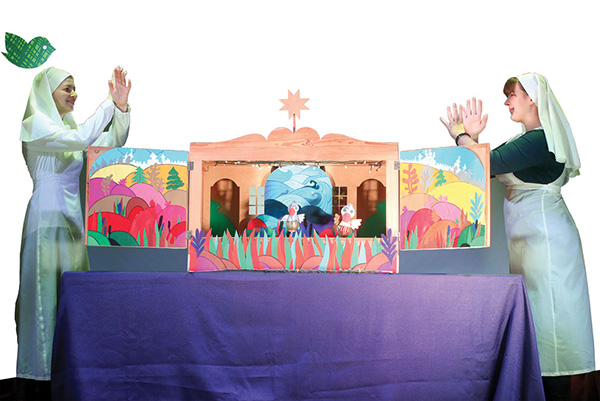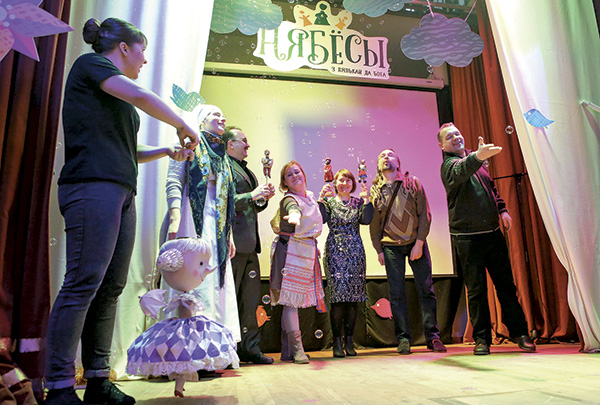Minsk hosts Republican Orthodox Batleika puppet theatre festival entitled, Niabiosy
The Minsk Saint Elisabeth Convent hosted the festival of traditional Belarusian Batleika theatrical art with the participation of 19 groups from Belarus, Russia and Ukraine. When one of adult puppeteers shouted at the, mostly juvenile, audience “Let’s do Batleika!”, they responded enthusiastically. The children of the convent’s Sunday school know it well. I am not sure however, that everyone is as familiar with this remarkable art form.

The Origins of Nativity puppet shows
Early examples of Nativity puppet shows, manger scenes and Batleika existed in ancient Greece. They are mentioned in church services in medieval Europe and came to Belarus through Poland. In those days, there was much contemplation of the world order, heaven and earth, space and time. They concluded there were three levels of existence; above was paradise, below was hell and in the middle, of course, was the earth. Craftsmen built a small house-like box with three storeys and simple puppets.
The box could be carried on the shoulders and passed from village to village and inn, showing performances about God, Satan, Herod the Great, angels, devils and peasant tales.
Naive puppets
Even into the 20th century, Belarus was recognized as an important source of European culture similar to Germany, Poland, Russia and Ukraine. We have little information about Belarusian Batleika, however, traces of it have been found in Vitebsk Region, Mir, Smorgon and Dokshitsy. In the beginning, it was the priests who worked with Batleika puppets, then the practice spread to the local peasantry, now it is a skill shown by pupils, students and professional actors.
We now have Batleika researchers, among them is the remarkable scientist Guriy Baryshev, who has proved that Belarusian Batleika is not simply folk theatre, but a whole cultural phenomenon closely connected by south-eastern Slavic roots. All Batleika festivals are now presented by a trinity of Russia, Belarus, Ukraine. It is not only a puppet performance in a box, but a festival of culture during the New Year holidays, where there are clowns, singing and dancing. This naive puppet drama is based both on religion and on our national mentality. For example, the three-storied house became two-storied in Belarus, as people were reluctant to give any attention to the devilry on the bottom storey.
In the past, the church moved to persecute Batleika for misrepresenting the Gospel, while the Soviets complained the plots were too bold and controversial or, bizarrely, not clear enough. It seemed that it was doomed to failure, to be a museum exhibit, but this unpretentious art continues to live and develop, because it offers spirituality, uses clear language and teaches sound morals, empathy and mercy.

The openhearted and ‘Tri Lika’
The Festival of Batleika Theatre for Children, Niabiosy, is a holiday for adults too, offering professional dialogue, an exchange of experiences, the development of international contacts and the strengthening of Christian traditions.
During the festival, Batleika actors also visit orphanages, nursing homes, and disabled children. Actors and the public communicate through the language of art and bring great pleasure to each other. There is a programme of concerts, as well as games and quizzes for the spectators. Performances of children from theatrical schools are held during the intervals. The festival has a jury of experts and a team of volunteers. Every day there are master classes on weaving, needlework, animation and performances by the clown, Pugovitsa. Actor, Andrey Trezubov, is not so much clown, as master of games and the children are thrilled to be involved.
Performance groups from Ukraine were unfortunately prevented from attending due to budget constraints, but sent an interesting video and presentation. Russia was represented by performers from Moscow and the city of Pushchino. Dushegrei Theatre headed by Svetlana Rupenkova, Alexander Gref’s Brodyachiy Vertep, TriLika Theatre headed by Victor Dragun showed a high level of professionalism and were recognized as the best of the acts. Alexander Gref’s theatre, which won the Grand Prix, has existed for 25 years and has its own Batleika festival called Stary Novy God (The Old New Year).
The Chairman of the Niabiosy Festival is the actor from the Russian Gorky Drama Theatre, Alexander Zhdanovich. He is recognizable among Belarusian children as the long-term (almost 20 years) anchorman of the TV programme Kalykhanka (Lullaby). He has a great deal of work at his native theatre, but Alexander decided to devote himself to this revival of the forgotten Batleika movement. At the festival he is both a presenter, and stage presence, as well as a comforter of crying children, and ringleader of the dances.
Dreams for Niabiosy
Talking to the participants, it became clear that the culture of Batleika is following a new pathway with the creation of troupes in schools and colleges. It actively fits in with professional theatre, not only puppet theatre, but also the dramatic version. The Yanka Kupala National Youth Theatre’s film studio has already created a Batleika performance and expects more to follow.
A good example of the propagation of Batleika art is the Chairman of jury, Head of the Monastery, Father Sergy (Khrapitsky), father of 9 children, four of whom participated in the festival.
The organizers of Niabiosy dream about the expansion of the competition programme at the invitation of groups from Poland, Lithuania, Germany and other countries. Belarusian Batleika theatres today seldom reach further than amateur level and rely on financial help from city organisations. The festival is based on the enthusiasm of the organizers and a small amount of financial support from the Minsk Saint Elisabeth Convent. There are dreams for the festival to become one of the largest spiritually-educational activities for the rising generation.
By Tatiana Orlova











